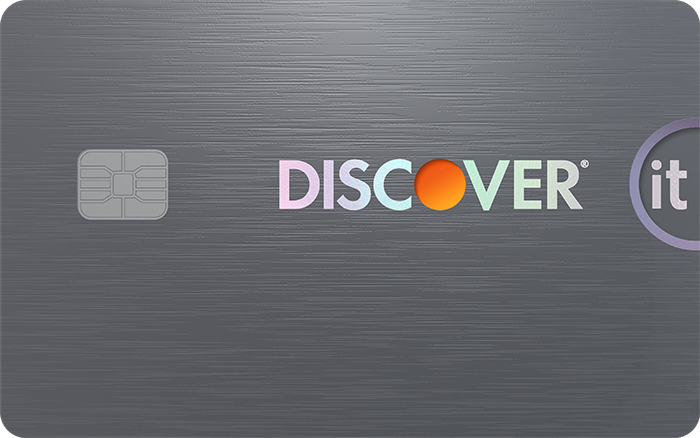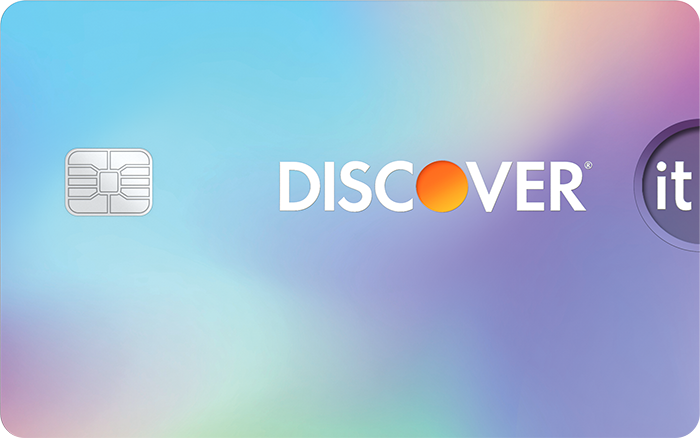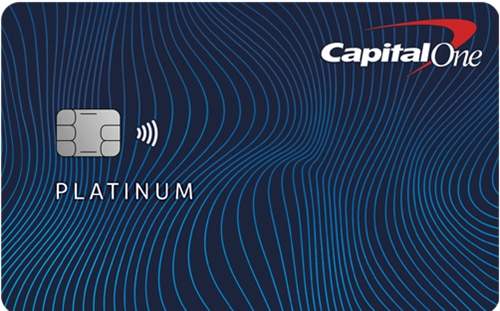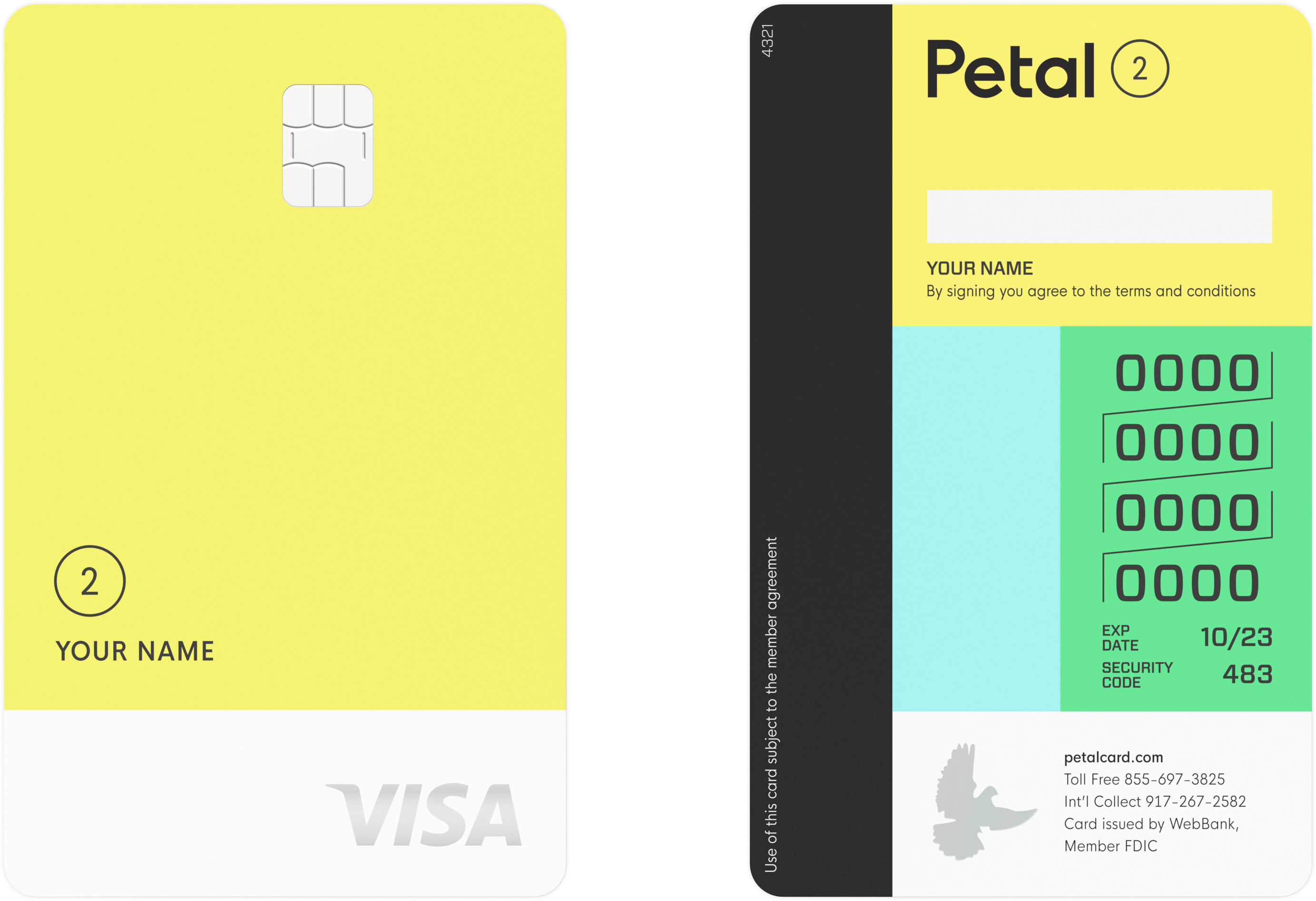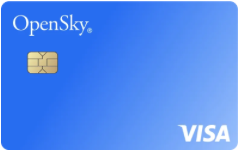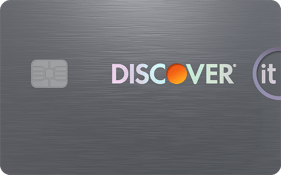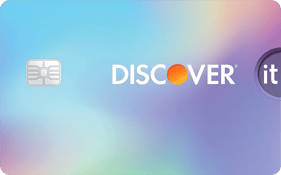It can be challenging to find a credit card when your credit isn't where you want it to be. The good news is, there are cards specifically made for those with lower credit scores. Start building and improving your financial profile with our best credit cards for bad credit.
- Our team of experts reviewed over 260 credit cards
- We evaluate all credit cards across the same 4 key criteria: value, welcome experience, fees, and perks
- Our credit card ratings are never influenced by our advertising partners
- If we wouldn't recommend an offer to a close family member, we won't recommend it to you
Our aim is to maintain a balanced best-of list featuring top-scoring credit cards from reputable brands. 'Best for' category selections on this page are determined by our editors, and a single card may be recognized in multiple categories.
Best credit cards for bad credit
- Low security deposit and building credit: Discover it® Secured Credit Card
- Cash back: Discover it® Student Cash Back
-
Low security deposit:
Capital One Platinum Secured Credit Card
Rates & Fees
-
Earning rewards:
Capital One Quicksilver Secured Cash Rewards Credit Card
Rates & Fees
- Cash back: Petal® 2 "Cash Back, No Fees" Visa® Credit Card
- Cutting fees: Petal® 1 "No Annual Fee" Visa® Credit Card
- No credit check: OpenSky® Secured Visa® Credit Card
- High secured credit limit: U.S. Bank Secured Visa® Card
- No minimum security deposit: Chime Credit Builder Secured Visa® Credit Card
Discover it® Secured Credit Card
Great for: Low security deposit and building credit
New/Rebuilding Under(579)
Intro APR
Purchases: N/A
Balance Transfers: 10.99%, 6 months
Regular APR
27.24% Variable APR
Rewards 2% cash back at Gas Stations and Restaurants on up to $1,000 in combined purchases each quarter. 1% unlimited cash back on all other purchases - automatically
1% - 2% Cashback
Annual Fee
$0
Welcome Offer
Discover will match all the cash back you’ve earned at the end of your first year.
-
We think this card has among the highest cash back potential for a secured card with no annual fee. The key is the Unlimited Cashback Match — Discover automatically matches the cash back new cardholders earn at the end of the first year. This card could be perfect for you if you're new to credit, or rebuilding after past troubles. Read Full Review
-
- Cash back rewards
- Great welcome bonus offer
- No annual fee
- Can graduate to an unsecured card
- Minimum deposit amount
-
- No credit score required to apply. No Annual Fee.
- Your secured credit card requires a refundable security deposit, and your credit line will equal your deposit amount, starting at $200. Bank information must be provided when submitting your deposit.
- 30 points or more—that’s how much you could increase your FICO Credit Score on average after just six months of responsible use.
- Automatic reviews starting at 7 months to see if we can transition you to an unsecured line of credit and return your deposit.
- Earn 2% cash back at Gas Stations and Restaurants on up to $1,000 in combined purchases each quarter, automatically. Plus earn unlimited 1% cash back on all other purchases.
- Discover could help you reduce exposure of your personal information online by helping you remove it from select people-search sites that could sell your data. Activate by mobile app for free.
- Get an alert if we find your Social Security number on any of thousands of Dark Web sites. Activate for free.
- Terms and conditions apply.
Discover it® Student Cash Back
Great for: Cash back
Fair (300-669)
Intro APR
Purchases: 0%, 6 months
Balance Transfers: 10.99%, 6 months
Regular APR
17.24% - 26.24% Variable APR
Rewards Earn 5% cash back on everyday purchases at different places you shop each quarter like grocery stores, restaurants, gas stations, and more, up to the quarterly maximum when you activate. Plus, earn unlimited 1% cash back on all other purchases.
1% - 5% Cashback
Annual Fee
$0
Welcome Offer
Discover will match all the cash back you’ve earned at the end of your first year.
-
Student credit cards are sometimes light on perks, but this Discover one might surprise you. You can earn 5% cash back on up to $1,500 of spending in rotating bonus categories -- just opt in every quarter. And earning 1% back on other purchases plus an innovative Unlimited Cashback Match welcome bonus makes this one worth considering for college students. Read Full Review
-
- Rotating bonus categories
- Valuable welcome bonus offer
- Good for avoiding fees
- Credit score monitoring
- Highly rated customer service
- No fixed bonus categories
-
- INTRO OFFER: Unlimited Cashback Match for all new cardmembers – only from Discover. Discover will automatically match all the cash back you’ve earned at the end of your first year! There’s no minimum spending or maximum rewards. So you could turn $50 cash back into $100. Or turn $100 cash back into $200.
- Earn 5% Cashback Bonus® at Grocery Stores and Wholesale Clubs, April 1 through June 30, 2025, on up to $1,500 in purchases, when you activate. Plus, earn unlimited 1% cash back on all other purchases.
- Redeem your rewards for cash at any time.
- No credit score required to apply.
- Discover could help you reduce exposure of your personal information online by helping you remove it from select people-search sites that could sell your data. Activate by mobile app for free.
- No annual fee and build your credit with responsible use.
- 0% intro APR on purchases for 6 months, then the standard variable purchase APR of 17.24% - 26.24% applies.
- Terms and conditions apply.
Capital One Platinum Secured Credit Card
Great for: Low security deposit
On Capital One's Secure Website.
On Capital One's Secure Website.
New/Rebuilding Under(579)
Intro APR
Purchases: N/A
Balance Transfers: N/A
Regular APR
29.74% (Variable)
Annual Fee
$0
Welcome Offer N/A
N/A
-
Comes with a low initial security deposit and no annual fee, making it a top pick if you want to open a secured card account without breaking the bank. Read Full Review
-
- No annual fee
- Low minimum deposit amount
- Can graduate to an unsecured card
- No minimum credit score required
- No rewards
- High APR
-
- No annual or hidden fees. See if you're approved in seconds
- Building your credit? Using the Capital One Platinum Secured card responsibly could help
- Put down a refundable security deposit starting at $49 to get a $200 initial credit line
- You could earn back your security deposit as a statement credit when you use your card responsibly, like making payments on time
- Be automatically considered for a higher credit line in as little as 6 months with no additional deposit needed
- Enjoy peace of mind with $0 Fraud Liability so that you won't be responsible for unauthorized charges
- Monitor your credit score with CreditWise from Capital One. It's free for everyone
- Get access to your account 24 hours a day, 7 days a week with online banking to access your account from your desktop or smartphone, with Capital One's mobile app
Capital One Quicksilver Secured Cash Rewards Credit Card
Great for: Earning rewards
On Capital One's Secure Website.
On Capital One's Secure Website.
New/Rebuilding Under(579)
Intro APR
Purchases: N/A
Balance Transfers: N/A
Regular APR
29.74% (Variable)
Rewards Earn unlimited 1.5% cash back on every purchase, every day. Earn unlimited 5% cash back on hotels and rental cars booked through Capital One Travel, where you'll get Capital One's best prices on thousands of trip options. Terms apply.
1.5%-5% cash back
Annual Fee
$0
Welcome Offer N/A
N/A
-
This no-annual-fee credit card earns an unlimited 1.5% cash back on all purchases, and offers free credit monitoring tools -- making it a solid secured credit card option for consumers who want to earn rewards while building or rebuilding their credit. Read Full Review
-
- No annual fee
- Unlimited cash back
- No foreign transaction fees
- Includes a free credit monitoring tool
- Potential to get your security deposit back as a statement credit
- Requires a security deposit
- No sign-up bonus
- High variable APR
-
- No annual or hidden fees, and you can earn unlimited 1.5% cash back on every purchase, every day. See if you're approved in seconds
- Put down a refundable $200 security deposit to get a $200 initial credit line
- Building your credit? Using a card like this responsibly could help
- Enjoy peace of mind with $0 Fraud Liability so that you won't be responsible for unauthorized charges
- You could earn back your security deposit as a statement credit when you use your card responsibly, like making payments on time
- Be automatically considered for a higher credit line in as little as 6 months with no additional deposit needed
- Earn unlimited 5% cash back on hotels and rental cars booked through Capital One Travel, where you'll get Capital One's best prices on thousands of trip options. Terms apply
- Monitor your credit score with CreditWise from Capital One. It's free for everyone
Petal® 2 "Cash Back, No Fees" Visa® Credit Card
Great for: Cash back
Fair/New to Credit Under(669)
Intro APR
Purchases: n/a
Balance Transfers: n/a
Regular APR
18.24 - 32.24% Variable
-
If you need to build credit, pay attention to this card. You qualify based on bank information, rather than credit, and there are no fees of any kind. Best of all, if you pay your monthly bill on time every time, your cash back rate will grow from 1% to 1.5% on purchases over your first year.
-
- For rebuilding credit
- No credit history required
- Competitive cash back rewards
- No fees
- Fixed payment due date
-
- No fees whatsoever. No late fee, foreign transaction fee, annual fee, or any-other-kind-of-fee, fee.
- Up to 1.5% cash back on unlimited everyday purchases (1% right away increases to 1.25% after 6 monthly on time payments and 1.5% after another 6 monthly on time payments)
- 2-10% cash back at select local and national merchants
- See if you’re pre-approved in minutes without impacting your credit score
- No Credit Score? No problem. Credit history isn’t required for approval
- Get an automatic credit limit increase after 6 qualifying on time monthly payments. Terms apply
- No security deposit required
- Petal reports to all 3 major credit bureaus
- Pay with ease with a contactless card or on your phone using Apple Pay, Google Pay, or Samsung Pay
- Card issued by WebBank
Petal® 1 "No Annual Fee" Visa® Credit Card
Great for: Cutting fees
Fair (300-669)
Intro APR
Purchases: n/a
Balance Transfers: n/a
Regular APR
25.24 - 34.74% Variable
-
The combination of cutting fees competitors charge, along with the opportunity to earn rewards, makes this a worthwhile card to consider when working on your credit.
-
- Easy approval process
- No annual fee
- Rewards from select merchants
- No foreign transaction fee
- Limited rewards opportunities
- High APR
- Petal has added fees before
-
- No annual fee, and no security deposit required
- 2-10% cash back at select local and national merchants
- See if you’re pre-approved in minutes without impacting your credit score
- No Credit Score? No problem. Credit history isn’t required for approval
- Get an automatic credit limit increase after 6 qualifying on time monthly payments. Terms apply
- Build credit alongside hundreds of thousands of Petal card members
- Petal reports to all 3 major credit bureaus
- Pay with ease with a contactless card or on your phone using Apple Pay, Google Pay, or Samsung Pay
- Zero liability fraud coverage
- Card issued by WebBank
OpenSky® Secured Visa® Credit Card
Great for: No credit check
New/Rebuilding Under(579)
Intro APR
Purchases: N/A
Balance Transfers: N/A
Regular APR
25.64%, variable
Rewards
N/A
Annual Fee
$35
Welcome Offer
N/A
-
A good option for new to credit applicants. The fact that there's no credit check could justify the annual fee for some cardholders Read Full Review
-
- No credit check
- Flexible credit limit
- Reports payments to all three credit bureaus
- Annual fee
- No rewards
- Minimum deposit amount
-
- No credit check is great for building credit
- $35 annual fee
- $200 minimum security deposit
U.S. Bank Secured Visa® Card
Great for: High secured credit limit
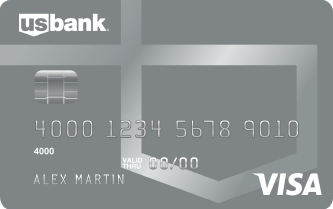
Fair/New to Credit Under(669)
Intro APR
Purchases: N/A
Balance Transfers: N/A
Regular APR
28.74% (Variable)
Rewards
N/A
Annual Fee
$0
Welcome Offer
N/A
-
This U.S. Bank secured card can help you build or rebuild credit with perks like no annual fee, free credit score monitoring, and the option to choose your own credit limit (from $300 to $5,000). Best of all, U.S. Bank keeps track of your progress and you'll be reviewed for the chance to upgrade to an unsecured card -- and get your security deposit back.
-
- Flexible approval requirements
- No annual fee
- Upgrades to unsecured credit card
- Free credit score monitoring
- Flexible payment dates
- Large minimum security deposit
- No rewards
- Foreign transaction fee
-
- Credit limit ranges from $300-$5,000 based on deposit.
- The deposit is put in an FDIC-insured savings account that earns interest and won't be touched as long as your account remains open and in good standing.
- Car rental insurance available at no additional cost if you charge the car rental on your card and decline rental company's collision damage waiver option.
- Free TransUnion® Credit Score.
- You are not responsible for unauthorized transactions if your U.S. Bank Secured Visa Card is ever lost or stolen.
Chime Credit Builder Secured Visa® Credit Card
Great for: No minimum security deposit

New/Rebuilding Under(579)
Intro APR
Purchases: N/A
Balance Transfers: N/A
Regular APR
N/A
Rewards
N/A
Annual Fee
$0
Welcome Offer
N/A
-
A solid card to consider for consumers with limited credit who want a secured card with no fees, no minimum security deposit, and no credit check for approval.
-
- No annual fee
- No credit check
- No minimum security deposit
- Reports to all three credit bureaus
- Must bank with Chime
- Functions similarly to a prepaid card
- No rewards
- No option to graduate to an unsecured card
-
- No interest or annual fee
- No credit check to apply
- No minimum security deposit required.
- No foreign transaction fee
How to get a credit card with bad credit
If you want to get a credit card with bad credit, your best bet is to see if you can get prequalified for a card. That way, you can make sure you will be eligible for a card without hurting your credit score with a credit check, only to find that you don't qualify.
While it depends on the card issuer, most of the major credit card companies have prequalification pages on their websites that let you check offers you'll likely be approved for.
To find out if you prequalify, you'll just need to enter some basic personal information. Most card issuers ask for at least some of the following:
- Full name
- Address
- Date of birth
- Last four digits of your Social Security number
Once you've submitted the required information, you'll see any cards that you have a good chance of qualifying for with that card issuer. Remember that this doesn't guarantee your application will be approved.
If you're not able to get prequalified for a credit card for bad credit, it's a good idea to take some time to work on improving your credit. Here's how to apply for a credit card and get approved.
What to look for in a credit card for bad credit
The most important thing to look for in a credit card for bad credit is its fees, but you should also check its APR, its minimum and maximum security deposits, and what kind of credit limit you can expect. Here's an explanation of how each of these are important.
-
Fees
Most credit cards have fees, but what you don't want are unavoidable fees.
Fees that should make you think twice are annual fees, monthly maintenance fees, and any other regular fees the card issuer charges no matter what. These are expenses you don't need, especially from a card that probably doesn't have many benefits.
Fees for cash advances or balance transfers shouldn't scare you off from a specific credit card -- you can easily avoid both by not making those types of transactions.
-
APR
Ideally, you'll pay your full statement balance and never incur interest charges. But it's also nice to have a credit card that won't gouge you in interest if you ever need to carry a balance. You can determine your interest payments by using an interest calculator.
-
Security deposit
With secured credit cards, you should check what the minimum and maximum security deposit amounts are. The one that's more important for you depends on how much you have saved for a security deposit.
If you don't have much saved, you'll need to ensure you can pay a card's minimum deposit amount. If you have solid savings and you'd like to pay more upfront for a higher credit limit, then you'll need a card that allows a high maximum deposit.
-
Credit limit
Research the credit limits a card offers. This information is usually available with secured credit cards, but you can sometimes get it for an unsecured card as well.
You don't need a ton of available credit. But if your credit limit is too low, it can be difficult to maintain a low credit utilization ratio, and that can affect your credit score.
-
Rewards
Not all credit cards for bad credit offer rewards, but some do. As you consider your options, you may want to prioritize cards that offer rewards because they can provide value to you.
You can expect to earn anywhere from 1% to 3% cash back for most credit cards for bad credit with rewards potential. It's worth noting that cards that offer higher rewards rates may have a cap on how much you can earn. You may be able to earn unlimited rewards at a lower earning rate. Remember, some cards for bad credit offer no rewards at all.
Can you erase a bad credit history?
You can't completely erase a bad credit history -- at least not overnight.
Late and missed payments stay on your credit reports for seven years. Usually the impact on your credit score fades over time, though.
There are a couple of options when it comes to removing specific concerns:
- Dispute it: if something is inaccurate on your credit report, contact each of the three credit bureaus to file an official dispute. The Federal Trade Commision has a sample letter you can use.
- Request a goodwill adjustment: if you have a late payment mark and you've been a loyal customer, reach out to your creditor. They may agree to remove that late payment mark, which can improve your credit history.
- Negotiate with your creditor: if you're looking to have a poor mark removed, ask if they will consider removing it if you pay the balance in full right away.
What is considered a bad credit score?
Bad credit scores range from 300 to 579 using the FICO system and 300 to 600 using the VantageScore system.
If you're new to credit scores, it's good to understand that there's more than one scoring system -- and that your credit score is a number that ranges from 300 to 850. FICO is the most widely used scoring system, and VantageScore is the second most popular.
When you have a bad credit score, you won't have many credit card or loan options. You'll likely only qualify for credit cards that are aimed at applicants who have bad credit. You may need to start with a secured credit card, which is a type of credit card where you pay a security deposit and then use the deposit as your line of credit.
What is the easiest credit card to get with bad credit?
Some bad credit cards have easier approval odds than others. Here is one option:
OpenSky® Secured Visa® Credit Card: While this is a secured credit card and will require you to make a deposit before using it, this card has a low annual fee and is a good choice for people who are rebuilding their credit or who have very limited credit. There is no credit check requirement when going through the application process, making it a good option for many.
If you've unsuccessfully tried to get other secured cards with no annual fee or any other credit card for bad credit, this one may be an easier and better option for you to consider.
Alternatives to credit cards for bad credit
If a credit card for bad credit isn't for you, there are some other options to explore.
Secured loan: A secured loan is a type of loan you can get when you put something of value, such as a car or home, up for collateral. If you're having trouble qualifying for a personal loan, a secured loan could be a good option to help you rebuild credit. However, it's important to remember that the lender can sell your collateral to pay back the loan if you miss payments. For more options and information, check out the best personal loans for bad credit.
Subprime credit card: In fact, you may receive offers in the mail inviting you to apply for these. Subprime credit cards typically have fees that end up costing you a lot of money. Take, for example, the First Access Visa® Credit Card. There's a $95 program fee to open the card. You pay an annual fee of $75 first year, $48 thereafter. But in year two, you also pay a $8.25 monthly servicing fee, totaling $99 annually.
To avoid all these extra fees and to know what you're getting into before you apply for a card, check the fee disclosure of any card you're considering. If there are fees just to keep the card open, it's probably not worth the cost.
Another option: Try to get a secured card. If that doesn't work out, check out Motley Fool Money's Total Visa® Credit Card review.
Compare credit cards for bad credit
| Card | Rating | Great For |
|---|---|---|
|
Rating image, 5.00 out of 5 stars.
5.00/5
Our ratings are based on a 5 star scale.
5 stars equals Best.
4 stars equals Excellent.
3 stars equals Good.
2 stars equals Fair.
1 star equals Poor.
We want your money to work harder for you. Which is why our ratings are biased toward offers that deliver versatility while cutting out-of-pocket costs.
|
Great For: Low security deposit and building credit |
|
|
Rating image, 5.00 out of 5 stars.
5.00/5
Our ratings are based on a 5 star scale.
5 stars equals Best.
4 stars equals Excellent.
3 stars equals Good.
2 stars equals Fair.
1 star equals Poor.
We want your money to work harder for you. Which is why our ratings are biased toward offers that deliver versatility while cutting out-of-pocket costs.
|
Great For: Cash back |
|
|
Rating image, 4.00 out of 5 stars.
4.00/5
Our ratings are based on a 5 star scale.
5 stars equals Best.
4 stars equals Excellent.
3 stars equals Good.
2 stars equals Fair.
1 star equals Poor.
We want your money to work harder for you. Which is why our ratings are biased toward offers that deliver versatility while cutting out-of-pocket costs.
|
Great For: Low security deposit |
|
|
Rating image, 5.00 out of 5 stars.
5.00/5
Our ratings are based on a 5 star scale.
5 stars equals Best.
4 stars equals Excellent.
3 stars equals Good.
2 stars equals Fair.
1 star equals Poor.
We want your money to work harder for you. Which is why our ratings are biased toward offers that deliver versatility while cutting out-of-pocket costs.
|
Great For: Earning rewards |
|
|
Rating image, 4.25 out of 5 stars.
4.25/5
Our ratings are based on a 5 star scale.
5 stars equals Best.
4 stars equals Excellent.
3 stars equals Good.
2 stars equals Fair.
1 star equals Poor.
We want your money to work harder for you. Which is why our ratings are biased toward offers that deliver versatility while cutting out-of-pocket costs.
|
Great For: Cash back |
|
|
Rating image, 4.00 out of 5 stars.
4.00/5
Our ratings are based on a 5 star scale.
5 stars equals Best.
4 stars equals Excellent.
3 stars equals Good.
2 stars equals Fair.
1 star equals Poor.
We want your money to work harder for you. Which is why our ratings are biased toward offers that deliver versatility while cutting out-of-pocket costs.
|
Great For: Cutting fees |
|
|
Rating image, 3.50 out of 5 stars.
3.50/5
Our ratings are based on a 5 star scale.
5 stars equals Best.
4 stars equals Excellent.
3 stars equals Good.
2 stars equals Fair.
1 star equals Poor.
We want your money to work harder for you. Which is why our ratings are biased toward offers that deliver versatility while cutting out-of-pocket costs.
|
Great For: No credit check |
|
|
U.S. Bank Secured Visa® Card

|
Rating image, 4.00 out of 5 stars.
4.00/5
Our ratings are based on a 5 star scale.
5 stars equals Best.
4 stars equals Excellent.
3 stars equals Good.
2 stars equals Fair.
1 star equals Poor.
We want your money to work harder for you. Which is why our ratings are biased toward offers that deliver versatility while cutting out-of-pocket costs.
|
Great For: High secured credit limit |
|
Chime Credit Builder Secured Visa® Credit Card

|
Rating image, 3.50 out of 5 stars.
3.50/5
Our ratings are based on a 5 star scale.
5 stars equals Best.
4 stars equals Excellent.
3 stars equals Good.
2 stars equals Fair.
1 star equals Poor.
We want your money to work harder for you. Which is why our ratings are biased toward offers that deliver versatility while cutting out-of-pocket costs.
|
Great For: No minimum security deposit |
Ask the experts

Todd Christensen, AFC®
Education Manager at Debt Reduction Services, Inc.
When should consumers consider working with a financial counselor to improve their credit? Is there a range or situation when it might be more beneficial?
I’m not a believer in building credit simply for credit’s sake. Still, having good credit is about more than just getting the best interest rate on a loan.
- Your credit rating affects your car insurance, so if you’re getting ready to purchase a vehicle or switch car insurance policies, you should meet with a financial counselor.
- Your credit history might be part of a background check the next time you apply for a job, so meeting with a financial counselor before switching jobs or careers could be helpful in landing your dream position.
- Most property managers will set minimum credit scores for applicant eligibility, so speaking with a financial counselor before moving could help you get into a better place to live. Plus, your credit rating determines how much, if any, you will have to put into a utility’s security deposit.
- If you’re thinking about buying a home, you should reach out to a financial counselor ahead of time to put together a plan for building your credit rating. It could mean the difference of tens of thousands or even a hundred thousand dollars of interest saved over the life of a 30-year mortgage. Unfortunately, most homebuyers seek credit advice from their realtor or, at best, their mortgage officer. Realtors tend to have no formal training in consumer credit issues. Loan officers, while they work with credit, focus more on selling and processing loans than on building a customer’s credit. I’ve heard nightmare stories from neighbors and clients of bad credit advice given by a well-intentioned but poorly informed lender or realtor. Seek out a financial counselor or a credit counselor instead.
- If you’re preparing to get married, you might benefit from a meeting with a financial counselor to create a plan to build or rebuild your credit for upcoming changes to your housing, such as moving into a new apartment or purchasing a home.
- For those struggling in their marriage or relationship with a partner, meeting with a financial counselor can bring an unbiased and dispassionate view to discussions about money in the relationship.
- Anyone headed for a divorce should meet with a financial counselor to understand the potential credit-related problems surrounding the household separation and even the divorce decree. Too many divorcees believe creditors are bound by the divorce decree, but they aren’t. If your names are on the account, you are ultimately responsible for making the monthly payment, regardless of what the divorce decree says.
- If you’re getting ready to graduate from college or are a recent college graduate, meeting with a financial counselor can help bust harmful myths about how and when to build your credit.
- The best time to reach out to a financial counselor is now, whether:
- things seem to be going well financially but you’d like unbiased, third-party insight to continue that progress
- things are going poorly with your credit, and you’re not sure whom to trust with your questions about rebuilding your rating or cleaning up your history
- you’re just getting by but you know you have room to improve your credit score
- Typically, consumers tend to reach out to financial counselors in times of crisis, such as:
- when they’re about to or have already missed a bill payment
- when they've been contacted by a collection agency
- when they're facing foreclosure or repossession
- when they've maxed out their credit cards due to medical emergencies or consumer overspending
How long does it typically take to improve credit with a financial counselor?
Depending on the type of issue dragging your credit down, you might see your credit score improve in a matter of a couple weeks or six to nine months. Correcting errors on your credit report can have an almost overnight impact on your rating. Using free products like Experian Boost can improve your credit immediately. Overcoming the negative impacts of years of spending issues and payment histories, though, can take up to a year or more to counter with positive credit-related behaviors.
How do financial counselors differ from advisors and planners?
Unfortunately, the basic term “financial counselor” has no licensing requirements, no copyright or trademark protection, and no exact definition. It has different meanings in different situations. Although a bit oversimplified, financial counselors tend to work with their clients to improve their day-to-day, month-to-month financial behaviors and choices, such as budgeting, credit building, debt elimination, and saving for emergencies and goals. In many cases, anyone can call themselves a financial counselor and not be in violation of any state regulations or licensing standards. That’s one reason I would always recommend you look for a specific type of financial counselor.
Accredited Financial Counselors® (AFC), on the other hand, offer counseling on budgeting, credit building, debt elimination, and consumer behaviors through private practice or through a sponsoring organization, such as a military base, university, or nonprofit. They must have 1,000 hours of experience and pass a rigorous test in order to use the title of AFC. (Disclaimer: I’m an AFC.)
Finally, financial advisors and planners are in the business of offering advice about or selling products to help their clients build wealth long-term. While financial advisors and planners require licenses to recommend and sell securities, insurance, and other financial products, AFCs do not sell or recommend products for commissions.
What are common misconceptions around working with a financial counselor?
One common misconception about working with a financial counselor is they only work with the extremes: the very rich or those in financial need. The truth is that most households would benefit from working with a financial counselor. According to Career Builder, nearly 80% of workers earning less than $100,000 a year live paycheck to paycheck even before the coronavirus pandemic. Plus, the Federal Reserve reports that 2 in 5 American households are unable to come up with $400 in an emergency without affecting their ability to pay their regular bills. Therefore, most American adults could use financial counseling, whether it involves building or rebuilding their credit rating, accelerating their debt elimination plans, or putting barriers in place to stop impulse spending.
Another misconception is that financial counselors charge large fees. Many Accredited Financial Counselors (AFCs) provide their services at no charge through a nonprofit, military base, or other organization. Others have set up their own private practice, giving them greater latitude in the services they provide. Still, their fees are reasonable for the short- and long-term financial benefits they provide.
Many people think meeting with a financial counselor would be too embarrassing or humiliating. But there is no shame in wanting to improve your situation. For example, AFCs are trained to avoid making the consumer feel ashamed of their previous behavior. Shame and embarrassment do not lead to positive changes. AFCs focus on future goals and objectives, not on past mistakes or choices.
Some people believe they have to get super organized with all their financial documents and bills before meeting with a financial counselor. Actually, financial counselors can help simplify the process of organizing household finances by helping to prioritize tasks and by providing recommendations for helpful apps and other tools.
FAQs
-
Yes, it's possible to get a credit card without a bank account. However, some card issuers may require you to have one in order to be approved for a card. It'll be easier to pay your credit bill if you do have a bank account, and you may qualify for more cards with one.
-
Yes, you can get a credit card after bankruptcy. It's important to remember that bankruptcy negatively impacts your credit situation. Because of this, you may qualify for less credit cards. You may need to apply for a secured credit card, which requires you to pay a deposit before using the card. In many cases, this deposit is equal to your starting credit limit. Another option is to apply for a subprime credit card. These cards have many more fees attached to them when compared with other cards. Because of these extra fees, these kinds of cards usually aren't the best choice.
-
There are a few ways that you can improve your credit score. Continuing to make on-time payments, keeping your credit card utilization low, and always paying at least the minimum amount due are all good ways to improve your financial habits and improve your credit score.
If you don't yet have a credit card, getting one is another way to improve your score. If you have a low score, you can apply for a credit card for bad credit. Make sure that you use the credit card regularly, even for small charges, and make all payments on time. With time and effort, you can improve your credit score.
-
While a cosigner can help you qualify for a loan when you have bad credit, most major credit card issuers don't allow them. However, some issuers will allow an account holder to add an authorized user. If someone adds you as an authorized user for their credit card, it could help you build credit.
We're firm believers in the Golden Rule, which is why editorial opinions are ours alone and have not been previously reviewed, approved, or endorsed by included advertisers. Motley Fool Money does not cover all offers on the market. Motley Fool Money is 100% owned and operated by The Motley Fool. Our knowledgeable team of personal finance editors and analysts are employed by The Motley Fool and held to the same set of publishing standards and editorial integrity while maintaining professional separation from the analysts and editors on other Motley Fool brands. Terms may apply to offers listed on this page.
The Motley Fool owns shares of and recommends Visa.
